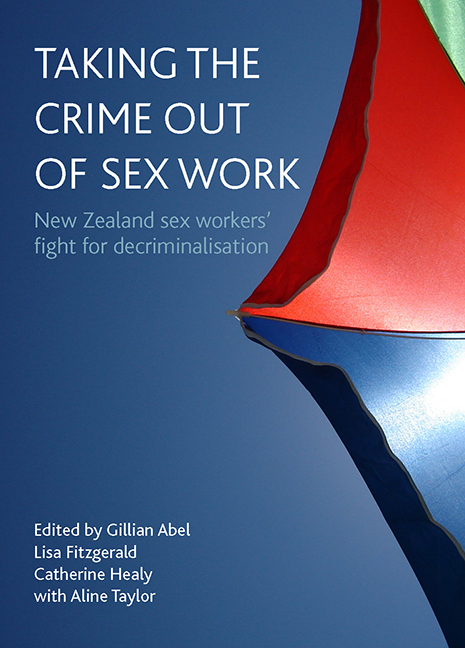Book contents
- Frontmatter
- Contents
- List of tables and figures
- Notes on contributors
- Acknowledgements
- one Introduction
- Part One Lead-up to the passing of the 2003 Prostitution Reform Act
- Part Two Implementation and impact of the 2003 Prostitution Reform Act: the first five years
- Index
- Also available from The Policy Press
thirteen - Risk and risk management in sex work post-Prostitution Reform Act: a public health perspective
Published online by Cambridge University Press: 01 September 2022
- Frontmatter
- Contents
- List of tables and figures
- Notes on contributors
- Acknowledgements
- one Introduction
- Part One Lead-up to the passing of the 2003 Prostitution Reform Act
- Part Two Implementation and impact of the 2003 Prostitution Reform Act: the first five years
- Index
- Also available from The Policy Press
Summary
Introduction
In many countries, including New Zealand, harm minimisation has been the predominant philosophy informing public health policy and underpinning the control of HIV/AIDS and other sexually transmitted infections (STIs). Among the sex worker population, the priority has been to reduce disease transmission through advice on safe-sex practices and to help in the implementation of such practices. Such traditional harm minimisation approaches assume that educating sex workers on HIV/AIDS and informing them of their responsibility in preventing transmission would mean that they would then make rational choices to protect themselves and others (Chan and Reidpath, 2003). Yet the assumption that sex workers are vectors of diseases serves to marginalise and blame sex workers without taking into account issues of poverty, gender, public fear and the law (Chan and Reidpath, 2003). Such structural and political issues need to be taken into account and integrated with health education for a more effective health promotion approach to the sex industry (Scambler and Scambler, 1995; Chan and Reidpath, 2003; Frieden et al, 2005).
Public health workers have, therefore, been challenged to take a more holistic approach to health promotion for sex workers (Wolffers and van Beelen, 2003). As well as HIV and other STIs, occupational health and safety issues, which include sexual and mental health, physical violence and coercion, are major health and safety concerns for sex workers and thus the protection of sex workers’ human rights needs to also be addressed for successful harm minimisation. This would necessarily require a harm minimisation approach to also take a human rights approach and encompass law reform to create safer working environments (Sanders, 2004a). Some harm reductionists have endeavoured to take a neutral approach (Lenton and Single, 1998), not taking any stance on decriminalisation or legalisation. These practitioners have, however, tended to take a very narrow view of harm minimisation, focusing on the medical means of promoting health and have been less concerned with structural social issues that also contribute to the overall health and well-being of sex workers (Sanders, 2004a).
It was with a broad and encompassing view of harm minimisation that decriminalisation of the sex industry was advocated by public health workers in New Zealand.
- Type
- Chapter
- Information
- Taking the Crime out of Sex WorkNew Zealand Sex Workers' Fight for Decriminalisation, pp. 217 - 238Publisher: Bristol University PressPrint publication year: 2010
- 2
- Cited by



